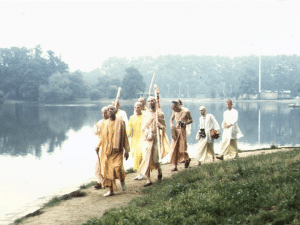New Vrindavan
New Vrindaban is spread out over a large area, and each section is called by a different name corresponding to the twelve different forests or vanas, of the original Vrindavana. Prabhupada took his morning walk along a dirt road in Talavana. The vale we walked in was a little dank and dark due to dense vegetation. A heavy mist hung low all across the valleys, but our immediate area was clear. Kirtanananda Swami pointed out various parcels of land which are becoming available. Glorifying the simple country life, Srila Prabhupada encouraged him to buy as much as possible. The devotees are growing hay on land rented from neighbors and this is stored in silos for the cows' winter feed. Kirtanananda Maharaja explained that they give only a third, or sometimes even just a quarter, of the produce in exchange for using the land. The neighbors would rather have this arrangement than leave the land untended because regular usage prevents trees from growing, which would ruin it. He told Prabhupada that they are also now cutting their own lumber. Prabhupada liked that. "That is the nature's way. You cut the lumber and make cottage, and the land is clear, then cultivate, get your food, and cows, give them grass."
As we walked past some dogs on the roadside they began to bark. "Immigration department!" Prabhupada joked. "We have got passport! That's all right." He chuckled. "Dog's business. Without any fault, they'll chastize. We have no fault, still they are chastizing." Kirtanananda said that although there is so much unused land, the government still says there is overpopulation. Srila Prabhupada said that he has never accepted this assertion. "There is no overpopulation. If the Americans allow the Chinese and the Indians to come, they can develop all these. 'No, this is our land, you cannot come.' Immigration? gow gow! In Bhagavatam we see that when Nanda Maharaja felt some disturbances from the demons, they decided to change the place. And they immediately, from Gokula, went to Vrindavana. But we don't find anything that they had to take permission. So that means formerly this was the system. If there is any vacant land, one can go and live there. There's no question of permission. When you live there and you make your professional activities, then the king will come, take little tax."
Kirtanananda said that was formerly the system in America. "They called it 'homesteaders.' If you would go and make your home there, you could have the land." "That is not for the foreigners," Prabhupada said. "If some Chinese men or Indian want to come ..." Kirtanananda Maharaja replied that foreigners used to be allowed, but now they don't allow anyone. "Just see," Prabhupada said. "Why?" "Because it has become very profitable for people to keep it. Because people are making money on it now." "Money they must make," Prabhupada granted, "otherwise, why they should come? But what is the objection? Just like in the marketplace, still, in India, the system is, the marketplace, anyone can go and sell his goods, and when he's selling, the proprietor takes some contribution. Not that he has to take permission. He's selling there, that's all right, 'Give me some, a little contribution.' The king has the right to tax for maintenance." As we drove back to the temple for darsana of the Deities and class, Kirtanananda Swami pointed out different patches of land where the devotees are growing a big variety of vegetables cauliflower, peas, beets, carrots, lettuce, spinach, potato, broccoli, cabbage and peppers. But he said that most of them are not yet fructified because this is early in the season. Prabhupada was well satisfied that the devotees are working on the land. He has said many times he wants us to learn how to be self-sufficient, gaining all our needs from the land. "Vegetables, ghee, milk, wheat, then what do you want more?" he asked. "We can grow all these things and eat very nicely. Where is economic problem?"
Reference: Transcendental Diary Volume 3 by Hari Sauri Dasa
Recently Added
Trending Today
